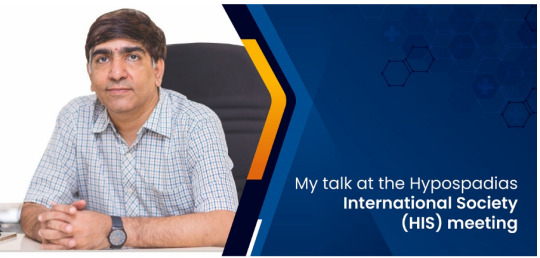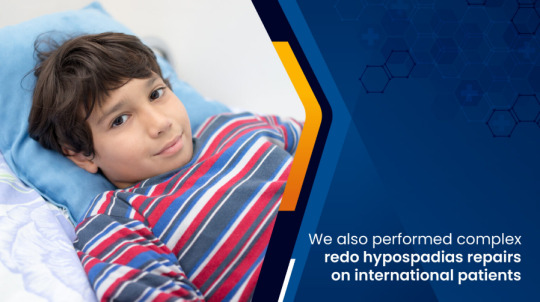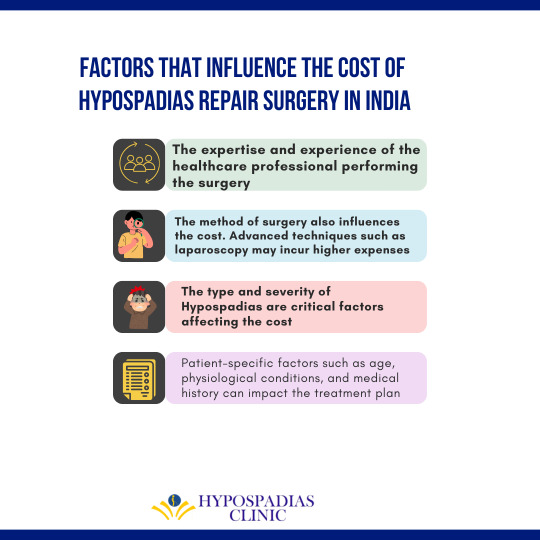#best results in hypospadias repair
Text
My talk at the Hypospadias International Society (HIS)meeting

I had the great privilege to take part in the HIS meeting held in Brazil a few months ago. I couldn’t go there physically due to some family commitments. So, I attended the virtual meeting for 3 days. In the meeting, I delivered a talk on 2-stage repair for complex failed hypospadias cases with the use of oral mucosal graft. I was among the very few doctors from India to attend this meeting and deliver a talk at this prestigious meeting.

Hypospadias is one of the most common congenital anomalies. Unfortunately, there is not much awareness in the general public or even among many doctors about this problem. There are several reasons for this:
Hypospadias is an external anomaly and is not usually life-threatening. So, most people think that it is a minor problem.
Many doctors also don’t realise that hypospadias surgery is a technically demanding operation and has to be only done by the best surgeon.
Most people have little awareness about the far-reaching complications of hypospadias, which not only affects urination but can potentially disrupt the normal adult life of the person and the family.
The social and psychological stigma associated with hypospadias. Being a genital problem, most parents are not ready to share the information with family and friends and take their help to search for the best doctor for hypospadias surgery.
Once the child grows older, he becomes shy and doesn’t discuss the problem with the parents anymore.
Most parents and many doctors think that hypospadias is a minor problem and seek a solution from the local doctors; if the surgery is successful, it is ok. But more often than not, the operation may result in failure, and only then do the parents start looking for an expert. This results in the child undergoing multiple operations, including more complex reoperations, which could have been avoided if an expert surgeon had been involved from the beginning.
Thus, hypospadias remains a common and neglected problem. In addition, many surgeons of many specialities perform hypospadias surgery, and there are hundreds of techniques for hypospadias repair. This makes things more complicated for parents to choose the best surgeon and for family physicians to refer these cases to the best surgeon for hypospadias!
The purpose of the Hypospadias International Society (HIS) was to disseminate proper knowledge about hypospadias correction techniques among its members. Many enthusiastic surgeons from across the globe participate in its annual meetings. The latest meeting in Brazil was attended by over 100 hypospadialogists. Various techniques of hypospadias repair, including primary and complex failed hypospadias repairs, were discussed by experts. The pros and cons of various techniques were debated by experts in a scientific atmosphere. The long-term follow-up and results of hypospadias repairs were also discussed.

My talk in the HIS meeting was about the most complex cases of hypospadias, which come after multiple failed operations elsewhere. These cases are very complex and require the expertise of the best hypospadias surgeon. Typically, a 2-stage (sometimes 3-stage) repair is performed utilising the skin taken from inside the oral cavity (mouth) as a graft to prepare the deficient urinary tube (urethra). We have done more than 100 such cases over the past 8 years in Hyderabad, with over 90% success of such complex operations. Our patients come from all over India, including Andhra Pradesh, Maharashtra, Karnataka, Tamil Nadu, Kerala, Orissa, West Bengal, Bihar and UP. We also performed complex redo hypospadias repairs on international patients who underwent their initial failed hypospadias operations in other countries.
My talk about the technique and results of complex hypospadias reconstructions at the HIS meeting was highly appreciated. I received positive messages from many surgeons across the world congratulating us for our work and the good results. However, an ideal situation is where no child requires such complex reconstructions for failed hypospadias. This is possible if the initial hypospadias surgery is performed by experts only. When choosing the best hypospadias surgeon for their child, parents should spend some time identifying the best surgeon with the best results in hypospadias repair. Remember, even the best surgeon can have complications (like the best driver can have an accident), but the complications will be a small percentage, usually minor and easily treatable. I discussed a few tips for parents in my earlier blog about how to choose the best hypospadias surgeon for their child. That blog may be referred to by those interested in knowing more about this.
#best hypospadias surgeon#initial hypospadias surgery#best results in hypospadias repair#failed hypospadias#complex redo hypospadias repairs#failed hypospadias repairs#best doctor for hypospadias surgery#Hypospadias#Hypospadias surgeon#failed hypospadias cases
0 notes
Text

It's commonly understood that the best age for hypospadias repair surgery is between 6-18 months for optimal results. However, success rates can vary based on factors such as the type and severity of hypospadias, the patient’s physiological conditions, the surgeon’s expertise, and post-operative care.
So, is it possible for an adult with a history of multiple failed hypospadias surgeries to have success with a redo surgery in adulthood?
Yes, there are certainly chances of success, although it's not 100% guaranteed. Here are the key factors that can influence the outcome:
Experienced Hypospadias Surgeon: It's crucial to find a surgeon who specialises in hypospadias repair and can evaluate the probable reasons for past failures to plan an effective surgery.
Surgeon’s Expertise in Redo Surgeries: Redo hypospadias surgeries in adults require different techniques compared to surgeries in children. An experienced surgeon with a track record of successful redo surgeries is essential.
Severity and Type of Hypospadias: The degree of hypospadias and the individual’s tissue health play significant roles. Adult tissues are different from those of children, and the position of the urethra must be carefully considered.
Physical and Psychological Preparedness: The individual’s overall physical health, mental preparedness, and positive attitude can greatly impact the success of the surgery. Effective communication and coordination with the surgeon are vital.
Medical History and Current Health: The patient’s complete medical history, including previous surgical techniques used, and current health conditions are crucial. This helps the surgeon tailor the surgical approach for the best possible outcome.
While challenges exist, with the right surgeon and careful planning, successful hypospadias repair in adulthood is achievable. Consulting a specialized urologist will provide a better understanding of the specific factors at play and the potential for a successful outcome.
0 notes
Text
Being Treated by Urologist - Conditions This Specialist Can Help With
An urologist is a medical doctor who specializes in problems related to the urinary tract and the genital organs for both genders. This kind of physician diagnoses, treats and monitors conditions that affect the bladder, kidneys, ureter, urethra and for males, the prostate. They are also able to perform surgery if it is required, such as procedures on the adrenal glands (which are glands that sit atop the kidneys). Best Urologist in Jaipur
Your primary care doctor may decide to refer you to an urologist for any number of reasons. Some of the most common disorders that are treated by this specialist include recurrent urinary tract infections (UTI's), overactive bladder, or interstitial cystitis. This healthcare provider also treats prostatitis, enlarged prostate, kidney stones, sexual dysfunction in both males and females, and infertility for both sexes. Any form of cancer that affects the urinary tract, such as bladder, kidney, prostate or testicular can also be treated by this medical provider. Some of these doctors receive special training in reconstruction and are able to repair genitalia or urinary tract abnormalities that result from congenital defects or from serous traumas, such as motor vehicle accidents.
A pediatric urologist is a physician who specializes in treating child patients only. When it comes to pediatric urology care, the most common problem these doctors treat are those related to urination (also referred to as voiding). It could be a bed wetting issue (known medically as enuresis) that a parent brings a child into the medical provider's office to discuss. Another common problem in youngsters is a condition known as vesicoureteral reflux (VUR). When this condition is present, urine flows backwards from the bladder to the kidneys. This sometimes occurs when the patient has had frequent UTI's. If the issue is not treated, it can lead to scarring of the kidneys. Urologist Treatment in Jaipur
There are other occasions when a child should be taken to see an urologist. If your pediatrician feels that the problem your youngster has is beyond his scope, he will send your child to a specialist for further examination and treatment. Undescended testicles are one reason to see a pediatric specialist, as is bladder exstrophy.
Epispadias is a birth defect in which the bladder and urethra do not form as they should and the pelvic bones do not sit together in a natural and normal manner. An orthopedic surgeon may need to do surgery on the pelvic bones before urinary repair can be undertaken. This is a medical condition that is rare. Children who suffer from this disorder should be taken to a large pediatric facility where there are staff that have sufficient expertise in this area of the medical field.
Hypospadias is a birth defect that can be seen in males. In this case, the meatus (which is where urine travels from the urethra) is found in the underside of the penis, as opposed to the tip where it is supposed to be found. The urologist can help with this congenital issue.
0 notes
Text
KIDNEY STONE TREATMENT IN HYDERABAD

The Department of Urology at AIG Hospitals offers a comprehensive urology care and treatment for common urological problems like prostate diseases, urinary stones, infections, malignancies, and strictures of the urethra. The department consists of experienced consultants who have expertise in handling all type of cases and is supported by advanced technology & world-class infrastructure to deliver an exemplary service.
Minimally invasive surgery
At AIG hospitals we are doing all advanced minimally invasive surgeries including laparoscopic and retroperitoneoscopic surgeries regularly.
Surgeries offered-
Lap/retroperitoneoscopic -simple nephrectomy
Partial nephrectomy
Radical prostatectomy
Radical cystectomy
Adrenalectomy
Ureterolithtomy
Pyelolithtomy
Renal transplantation
At AIG one of the most experienced best kidney transplant hospital in Hyderabad team including the transplant surgeons and nephrologists are there with exposure of more than 3000 kidney transplants.
All types of complex kidney transplant procedures like multiple vessels, 2nd and 3rd transplants are performed.
Pediatric Urology
All urological diseases and congenital malformation related to genitourinary organs are dealt, with the best of care and surgical expertise.
Surgeries offered
Lap pyeloplasty
Open pyeloplasty
Reimplant surgery
Valve fulguration
Vesicostomy
Hypospadias repair
Mitrofanoff procedure
Orchiopexy
All key hole and endoscopic surgeries for stones.
Reconstructive urology
All kind of urethral reconstruction like end -2 anastomotic, graft and flap urethroplasties are regulary performed with very good results.
Pelvic fracture urethral distraction defects are also managed well with excellent outcome.
Major ureteral reconstruction like ileal replacement and yang montie procedure, failed pyeloplasty, augmentation ileocystoplasty etc are also performed regularly as many referred cases come to us we are giving affordable kidney transplant cost in Hyderabad.
Uro-oncology
All type of uro oncological cancers are treated here with comprehensive care including the medical and radiation oncologist.
Surgeries for kidney, bladder, prostate, adrenal, testes and penile cancers are performed with latest technologies with minimally invasive approach
Urogynaecology
Urological ailments of females like UTI, urinary incontinence, ureterovaginal/vesicovaginal fistula are routinely treated in the department.
0 notes
Text
What parents should know about hypospadias
ILLUSTRATION: PATRICK BIBBINS/BOSTON CHILDREN’S HOSPITAL
It’s one of the most common birth defects, affecting an estimated 1 out of 200 boys. But most parents aren’t aware of hypospadias until their child is diagnosed with it. In this condition, the opening of a boy’s urethra (through which both urine and semen pass) is located on the underside of his penis rather than at the tip of it. In about 80 percent of boys with hypospadias, this opening is found near the end of the penis. Fifteen percent of those boys also have a condition called chordee, in which the penis curves downward to varying degrees. Hypospadias is usually diagnosed at birth, but severe cases are increasingly being diagnosed in utero with ultrasonography.
Fortunately, hypospadias can be easily corrected through outpatient surgery, explains Dr. Carlos Estrada, a physician in the Department of Urology at Boston Children’s Hospital. Here, he answers some common questions that parents ask about hypospadias.
What causes hypospadias?
Hypospadias is a congenital condition, which means that it develops while your baby is still in the womb. It isn’t clear what causes hypospadias, although its incidence has been increasing over the past several decades. There does seem to be a genetic link: The condition appears to be slightly more common in boys whose father or brother also had it.
What are the treatment options?
Treatment may not be necessary for boys with very mild forms of hypospadias that are unlikely to interfere with normal functioning. However, most children with hypospadias will require treatment — without it, they may experience urinary and sexual difficulties later in life.
“The goals of treatment are to reposition the opening of the urethra, straighten the penis if necessary and improve its outward appearance,” says Dr. Estrada. “Surgery remains the only way to permanently correct hypospadias.”
What does surgery involve?
Unless hypospadias is very severe, surgery to correct it usually only lasts about one to two hours and ideally takes place when a boy is 6 to 12 months old. It is performed under general anesthesia, and most children get to go home the same day. To keep the new urethra open as it heals, the doctor will leave a soft drainage catheter in place for about a week. Your child’s care team will instruct you on how to care for all aspects of his recovery at home.
Can boys with hypospadias be circumcised?
In many boys with hypospadias, the foreskin (the fold of skin covering the tip of the penis, or glans) also doesn’t develop properly, resulting in extra foreskin on the top of the penis and none on the underside. This can affect how and when your son is circumcised — the foreskin may be needed for the repair, for example.
Will it affect potty training?
Many parents worry that hypospadias and the surgery to correct it might interfere with the potty-training process. Because the best window for hypospadias surgery is between the ages of 6 and 12 months old, your son will be healed well before potty training begins.
Will it affect future sexual function?
No. Once the problem is repaired, he shouldn’t experience any future sexual dysfunction due to hypospadias.
Learn about the Department of Urology and read more about hypospadias and its treatment.
The post What parents should know about hypospadias appeared first on Thriving Blog.
from Thriving Blog https://ift.tt/2PdZCfb
0 notes
Text

Hypospadias, a common congenital abnormality affecting young boys, often necessitates repair surgery to improve quality of life and prevent psychological impact as they grow older. However, understanding the costs involved in this procedure is crucial for families considering treatment options.
In India, the cost of Hypospadias surgery can vary significantly, ranging from 30,000 to 2,00,0000 rupees, depending on several factors.
Firstly, the expertise and experience of the healthcare professional performing the surgery play a significant role in determining the cost. Surgeons with more experience and higher success rates typically charge higher fees.
2.The method of surgery also influences the cost. Advanced techniques such as laparoscopy may incur higher expenses compared to conventional open surgeries due to their precision and minimally invasive nature.
3.The type and severity of Hypospadias are critical factors affecting the cost. Cases with higher severity may require more time and involve greater complexity, resulting in higher surgical expenses.
4.Additionally, patient-specific factors such as age, physiological conditions, and medical history can impact the treatment plan and, consequently, the cost of surgery. Complications or previous failures may also require additional resources and expertise, contributing to overall expenses.
Ultimately, while cost is an important consideration, prioritising the expertise and experience of the healthcare provider and ensuring the best possible outcome for the patient should be paramount.
0 notes